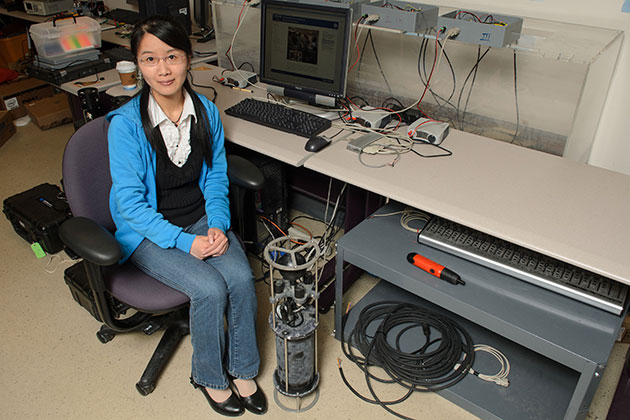
To say Zhaohui Wang has been on the fast track to success at the University of Connecticut would be an understatement.
Since Wang, who will accept her Ph.D. in electrical and computer engineering this summer, began her work at UConn, she’s published 12 journal papers and 17 conference papers, worked on two proposals funded by the National Science Foundation, and has co-authored a textbook, OFDM for Underwater Acoustic Communications, due to be published later this year.
All that in just four years: Wang started her research, which focuses on wireless communication and signal processing in underwater environments, in 2009.
“The amount of time she’s spent in the lab and the office in four years is as much as other Ph.D. students spend in six years,” says her advisor, Shengli Zhou, associate professor of electrical and computer engineering.
Wang certainly stands out for her achievements, but also in a way that she hopes will soon be less notable: women are significantly underrepresented among the ranks of engineers. According to a report last year by the Congressional Joint Economic Committee, women make up only about 14 percent of U.S. engineers.
“I want to encourage women to get into this field,” says Wang, who hopes to secure a faculty position at an American university after receiving her Ph.D. “I want to show girls how rewarding this type of research is.”
Her desire to encourage other women to pursue scientific research is one of the things that sets her apart, according to Zhou.
“She has not only demonstrated outstanding academic achievements and remarkable innovation and creativity in her research, but also a desire to pursue an academic career where she may serve as a mentor and role model to other female engineering students,” he says.
Wang will certainly have no shortage of options for ways to apply her research. On a recent visit to a lab, she ran through all the potential uses for her work.
Using specially designed underwater modems like the OFDM Modem she showed off during a recent visit to her office, researchers can gather valuable data about everything from hurricanes to commercial oil drilling operations. Her research has applications for fields ranging from the study of climate change to homeland security: basically, everything that goes on below the surface of the water.
Wang has already developed two algorithms that have been implemented in underwater acoustic modems that are now available to academic users, with the goal of speeding the development of ocean exploration and other applications.
Although Wang, who was born in Jining, Shandong Province, China, and attended the Beijing University of Chemical Technology and the Chinese Academy of Sciences’ Graduate University before coming to UConn, is looking forward to receiving her doctorate, she says it is slightly bittersweet.
“I’ll miss all the professors and students here,” she says.
One of the pleasant surprises of her time at UConn has been the friendliness and support she’s encountered across campus.
“I didn’t expect people here to be so willing to help, not only my advisor, but other professors and students in the community,” she says. “I need to get used to American life, and I was impressed that they were so friendly.”
And, while Wang’s accomplishments may seem intimidating to some students pondering a career in the sciences, they’re all the result of nothing more extraordinary than hard work, she says.
“I just want students to know they need to find their passion in their life and stay focused, and they can achieve their dreams,” she says.



